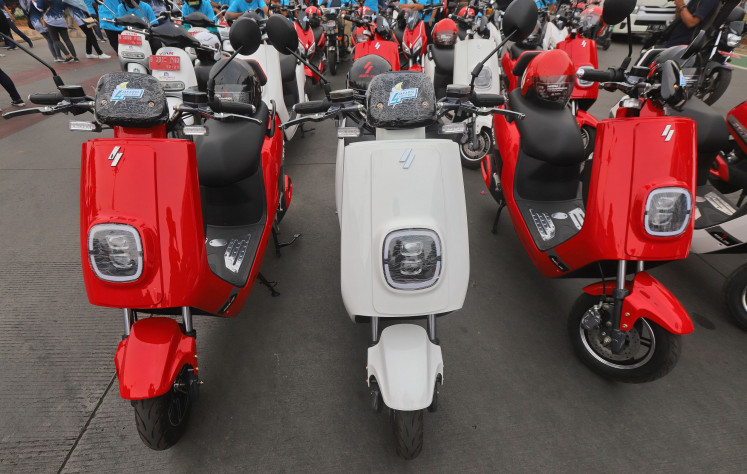ASEAN still lacks women leadership
Stand up for your rights!: Women activists from various organizations march in the Thamrin area of Central Jakarta on Sunday
Change text size
Gift Premium Articles
to Anyone

S
tand up for your rights!: Women activists from various organizations march in the Thamrin area of Central Jakarta on Sunday. They demanded the establishment of a legal system to protect women, the passage of pro-women laws, the revocation of discriminatory regulations, the rejection of bills that threaten women’s rights and the recognition of gender equality.(JP/Wendra Ajistyatama)
A look at ASEAN's busy calendar of annual meetings suggests that the organization is still predominantly run by men — currently, nine out of 10 ASEAN leaders and foreign ministers are male.
Myanmar's State Counselor Aung San Suu Kyi stands out as the only woman to helm a Southeast Asian nation. Similarly, Indonesian Foreign Minister Retno LP Marsudi is the country's first woman to fill the role, and she is currently the only woman among top diplomats from the region.
In ASEAN’s 53 years of existence, women have remained underrepresented among its elite and bureaucracy, with activists believing it has much to do with entrenched cultural norms and the lack of political will to make gender equality and women’s empowerment a more prominent goal.
Historically, only a handful of Southeast Asian nations have appointed women as foreign ministers, with most coming from the Philippines.
Coincidentally, the Philippines has the highest ratio of women to men in leadership positions: as many as 96 women hold a position of power for every 100 men who hold similar roles, according to 2018 data from a study by McKinsey Global Institute.
That same study places Malaysia, Indonesia and Vietnam at the opposite end of the spectrum, with only 26, 30 and 35 women holding high positions for every 100 men at a similar level, respectively.
Meanwhile, Southeast Asian women in charge of entire nations are even harder to come by.
This underrepresentation of women had resulted in "low and minimal" political ownership of gender issues on the ASEAN agenda, FORUM-ASIA's Rachel Arinii Judhistari argued recently.
This comes despite the establishment of the ASEAN Commission on the Promotion and Protection of the Rights of Women and Children (ACWC) a decade ago, part of a mandate under the ASEAN Human Rights Declaration.
The commission is tasked with promoting and protecting the rights of women and children and is responsible for mainstreaming a commitment and common understanding on gender issues.
“Regardless of the overall acknowledgement of gender issues by ASEAN, it is also evident that they are utilizing a reductionist approach, so it becomes a sort of 'tick-the-box' agenda item,” said Rachel, the NGO's East Asia and ASEAN program manager, at a discussion in Jakarta on Friday.
"You have the ACWC, but systematically they are weakening the mechanism."
Ironically, all 10 ASEAN countries have ratified the Convention on the Elimination of Violence Against Women (CEDAW) and the United Nations Convention on the Rights of the Child (UNCRC).
Furthermore, ASEAN has a regional plan of action for eradicating violence against women and children, and all member states have set up ministries in charge of women's and children's rights.
And while the ACWC had been invited by other bodies to provide advice on gender equality mainstreaming, Rachel suggested ASEAN should put in more substantive work on gender equality.
“[The commission is] mandated to review national laws that affect women and children, but because of this low level of political ownership these functions could not be fully implemented,” she said.
Fitriani of the Jakarta-based Centre for Strategic and International Studies (CSIS) echoed this point, arguing that the reason women were not visible enough in ASEAN was largely political.
“Even within the ASEAN Secretariat, how many women can actually reach the deputy secretary-general level? [...] That in itself is something we need to change,” she said during the discussion.
At the bureaucratic level, ASEAN has been quite productive when it comes to issuing joint statements, declarations and commitments on gender issues, but Indonesia's representative to the ACWC, Sri Danty Anwar, insists that the implementation of such commitments ultimately depends on the political will of each member country.
“It is the reality everywhere that women's issues are not considered important, partly because of the low political commitment but also because there is a mindset that issues relating to women and children do not require much funding — that we would rather focus on [funding for] building roads and buildings,” Danty said.
Besides a lack of political will, society in Southeast Asia is also predominantly patriarchal. The formation of the bloc itself lends itself to practices that have a patriarchal bent.
ASEAN was founded in 1967 by five foreign ministers from the region — all men. They used "sport shirt diplomacy" to play golf — a pastime for wealthy men in the region — while sorting out disputes and political differences. Such informal processes have become part of ASEAN tradition, according to an entry on ASEAN's website.
“In this patriarchal society, there is still a long way to go until more women can [make a difference through] politics and decision-making,” Danty said.









